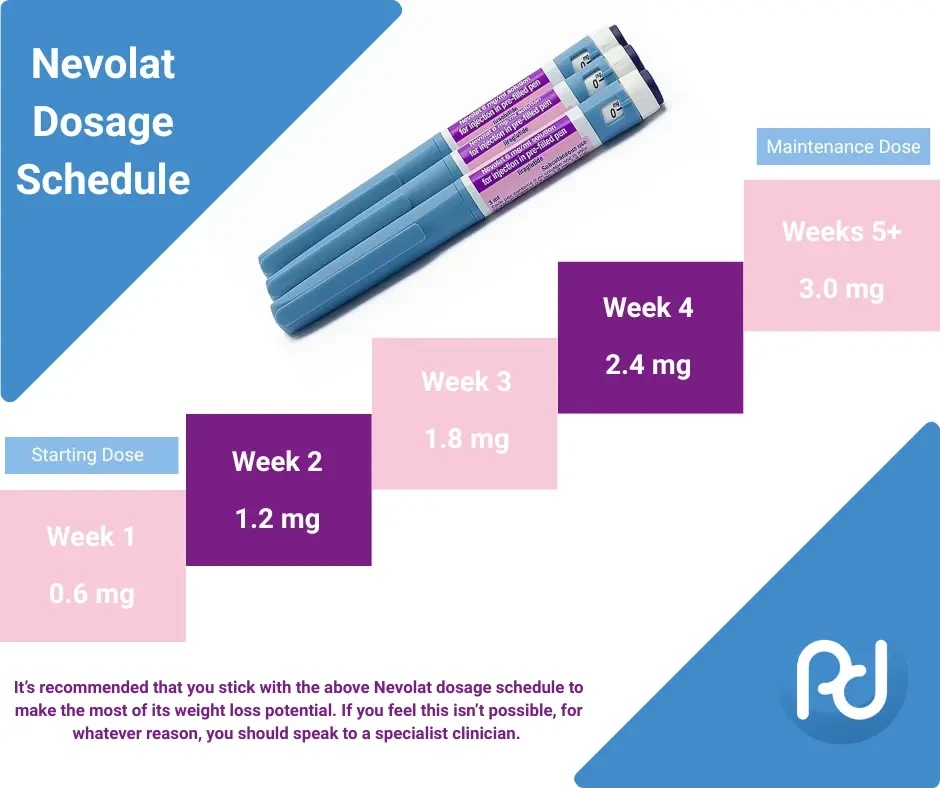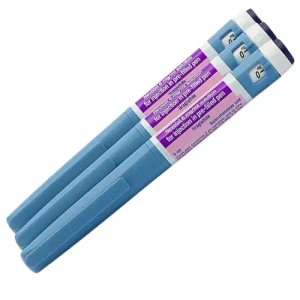What are the Side Effects of Nevolat?
Table of contents:
- The Main Side Effects of Nevolat
- How to Manage Nevolat Injection Side Effects
- When Do the Side Effects of Nevolat Appear?
- How Long Do Nevolat Side Effects Last?
- How Nevolat Side Effects Compare to Other Weight Loss Treatments
- The Side Effects of Nevolat: Frequently Asked Questions
- Ready to Begin Your Nevolat Journey? Get Started with Prescription Doctor Today
Nevolat, an injectable weight loss drug, has an impressive track record for helping people shed significant amounts of weight. If you’re on your own weight loss journey, you may already have heard of Nevolat or its active ingredient, liraglutide. However, you may be less familiar with the potential side effects of this medication.
The side effects of Nevolat can be mild, moderate or severe, and may flare up at different points of your treatment plan. If you’re considering Nevolat as a weight loss tool, understanding its potential side effects — and how to manage them — is key to a successful journey. Read on to learn what you can expect when taking Nevolat, as well as the steps you can take to address and reduce your symptoms.
START YOUR NEVOLAT CONSULTATION TODAY
The Main Side Effects of Nevolat
Nevolat contains liraglutide, a GLP-1 agonist in the same drug class as Semaglutide (the active ingredient in Wegovy). Gastrointestinal issues are common among people using GLP-1 medications, with a large percentage of users reporting nausea, vomiting, and diarrhoea. Fortunately, most Nevolat side effects are temporary and can be alleviated with small lifestyle adjustments.
However, in rarer cases, Nevolat treatment can trigger more serious side effects that may indicate deeper health problems. If you do find yourself struggling with the side effects of Nevolat, it’s essential to consult our clinicians for advice, as the medication may not be suitable for your circumstances.
Common Side Effects of Nevolat
Digestive problems are among the most common side effects of Nevolat. At least 10% of Nevolat users are affected by:
- Nausea
- Vomiting
- Diarrhoea
- Constipation
- Headaches
- Heartburn
- Difficulty sleeping (insomnia)
- Pain, irritation, itching, or rashes around the injection site
Liraglutide, the active ingredient in Nevolat, lowers blood sugar and can increase your risk of hypoglycemia. This most often affects people who take Nevolat alongside other diabetes medications, such as insulin or sulfonylureas. The warning signs of hypoglycemia (low blood sugar) are:
- Irregular heart rate
- Changes in vision
- Inability to speak clearly
- Sleepiness
- Irritability
- Anxiety
- Confusion
- Shakiness
- (In severe cases) seizures or loss of consciousness
Uncommon Side Effects of Nevolat
Uncommon side effects of Nevolat are thought to affect up to 1% of people and may require medical attention. These include:
- Dehydration (possibly due to vomiting and diarrhoea)
- Gallbladder inflammation
- Delayed emptying of the stomach
- Allergic reactions
- Rapid pulse
- Feeling generally unwell
Rare Side Effects of Nevolat
Rare Nevolat side effects are only observed in about 1 in every 1000 patients, but they require urgent medical attention. These are:
- Reduced kidney function and kidney failure
- Severe allergic reactions (anaphylaxis)
- Inflammation of the pancreas (pancreatitis)
Always speak to a healthcare professional if your side effects are particularly uncomfortable or persistent.
Nevolat
How to Manage Nevolat Injection Side Effects
In many cases, the side effects of Nevolat are temporary. They tend to flare up at the start of treatment and during dose increases, but usually ease off over time. You can further alleviate digestive problems caused by Nevolat with small dietary changes, such as:
- Eating smaller portions at mealtimes
- Only eating when hungry and stopping when full
- Avoiding fatty and spicy foods
- Avoiding alcohol and carbonated drinks
- Increasing fibre and water intake to combat constipation
- Increasing fluid intake to reduce the risk of dehydration
Severe or persistent gastrointestinal issues should always be discussed with a clinician. They may suggest the use of over-the-counter remedies, such as anti-vomiting or antidiarrhoeal medicine. They may also recommend a slower dose escalation plan, as nausea and other side effects often coincide with dose increases.

When Do the Side Effects of Nevolat Appear?
Gastrointestinal issues caused by Nevolat often begin within the first few weeks of treatment, and may begin as early as the day of your first dose. Dehydration is also most likely to occur at the start of treatment, possibly due to vomiting and diarrhoea.
Side effects can also return when you increase your dose, but typically pass as your body adjusts to the medication. If you experience digestive problems on Nevolat, following the advice listed above may help to alleviate your symptoms. However, it is always advisable to consult a healthcare professional if your symptoms persist or do not improve.
How Long Do Nevolat Side Effects Last?
Nevolat side effects are typically temporary, and affect most people at the start of treatment and during dose increases. They usually improve within days or weeks, and may be alleviated by making certain adjustments to your diet. Some people may not even experience any side effects of Nevolat at all.
How Nevolat Side Effects Compare to Other Weight Loss Treatments
Nevolat contains liraglutide, which belongs to a class of drugs called GLP-1 agonists. Other GLP-1 agonists include tirzepatide (the active ingredient in Mounjaro) and semaglutide (found in Wegovy).
All GLP-1 agonists cause similar side effects, the most common of which are gastrointestinal problems. The main side effects of Nevolat, Mounjaro and Wegovy are nausea, vomiting, diarrhoea, and constipation, and these occur at similar rates with all three medications.
The uncommon and rare side effects of Nevolat, Mounjaro, and Wegovy include pancreatitis, gallbladder problems, kidney problems, allergic reactions, and hypoglycemia. These affect a far smaller number of people, but shouldn't be overlooked as they can have serious health consequences. If you experience any side effects with Nevolat, consult a clinician for advice.
If you’d like to know more about how Nevolat compares against Mounjaro and Wegovy, check out our dedicated articles for a thorough breakdown.
The Side Effects of Nevolat: Frequently Asked Questions
Nevolat is a relatively new product in the world of weight loss injections, but its active ingredient, liraglutide, is a well-established treatment. Most of its side effects are gastrointestinal in nature and, for most people, these pass with time. You may have heard that Nevolat can cause other side effects, such as acne and blindness, but is there any truth to this?
Below, we’ll answer the most frequently asked questions about the side effects of Nevolat.
Nevolat
Is Nevolat Safe to Take With Other Medications?
If you already take medication, you will need to consult a clinician before starting Nevolat treatment. This is because Nevolat can interact with other medicines in ways that may cause health problems.
For example, Nevolat lowers blood sugar. Taking it alongside other GLP-1 agonists or antidiabetic drugs can produce a sharp drop in blood glucose levels and may result in hypoglycemia.
Can Nevolat Cause Blindness?
While there may be an association between the use of GLP-1 agonists and vision loss, there is no evidence to suggest that Nevolat causes blindness. The link potentially comes from the fact that liraglutide is frequently prescribed to individuals with type 2 diabetes, a leading cause of blindness. This may account for reports of vision loss among people using Nevolat.
Instead of damaging your eyesight, it’s possible that Nevolat may even reduce the risk of blindness in people with type 2 diabetes.
Does Nevolat Cause Acne?
Some Nevolat users report outbreaks of acne during treatment, but GLP-1 agonists are not necessarily bad for your skin. Research has not found any evidence of a direct link between Nevolat (or other GLP-1 agonists) and the development of acne. Instead, the weight loss caused by these medications may trigger hormonal changes in the body, which can contribute to the development of spots.
Are the Side Effects of Nevolat and Saxenda the Same?
Because Nevolat and Saxenda contain the same active ingredient, liraglutide, both medications would cause the same side effects. While both treatments support weight loss in similar ways and have comparable dosing schedules, they cannot be considered identical to one another.
To learn more about the similarities and differences between Nevolat and Saxenda, please read our comprehensive comparison article.
Ready to Begin Your Nevolat Journey? Get Started with Prescription Doctor Today
If embarking on a weight loss journey seems like a daunting prospect, the good news is you don’t need to go through it alone. Prescription Doctor has been supporting people with achieving their goals since 2013, and we’re ready to do the same for you.
Our weight loss consultation service provides comprehensive guidance on choosing the right product for you, whether that’s Nevolat or one of our alternative treatments. We also offer advice on diet plans (including vegan options), information about exercise plans, and tips and tricks to help you make the most of your medication. Our clinicians will also regularly check in with you to monitor your progress and ensure everything is on track.
To get started, complete our online medical questionnaire. This enables our specialist clinicians to assess whether the treatment is suitable for your circumstances. If your order is approved before 3pm on a weekday, we’ll dispatch the medication for discreet next-day delivery. It’s that straightforward.
Ready to take your first steps to losing weight? Get started with a consultation today.
Sources
- NIH (2024): Glucagon-Like Peptide-1 Receptor Agonists.
- EMC: Nevolat 6 mg/ml solution for injection in pre-filled pen.
- NIH (2024): Liraglutide.
- NIH: Low Blood Glucose (Hypoglycemia).
- PubMed (2024): Delayed Type Hypersensitivity Reaction Induced By Liraglutide With Tolerance to Semaglutide.
- Taylor & Francis (2021): Managing the gastrointestinal side effects of GLP-1 receptor agonists in obesity: recommendations for clinical practice.
- AJHP (2014): Alternative dosing strategies for liraglutide in patients with type 2 diabetes mellitus.
- UK Government: GLP-1 receptor agonists: reminder of the potential side effects and to be aware of the potential for misuse.
- PubMed (2024): Glucagon-like Receptor-1 agonists for obesity: Weight loss outcomes, tolerability, side effects, and risks.
- NEJM (2010): Weighing Risks and Benefits of Liraglutide — The FDA's Review of a New Antidiabetic Therapy.
- PubMed (2021): Liraglutide, 7,8-DHF and their co-treatment prevents loss of vision and cognitive decline in a Wolfram syndrome rat model.
- PubMed (2024): A meta-analysis of the incidence of acne vulgaris in patients treated with GLP-1 agonists.
Authored By

Kate Latham
Medical Content WriterPublished on: 15/07/2025
Reviewed By

Mohamed Imran Lakhi
MPharm - Lead PharmacistReviewed on: 15/07/2025
© 2013 - 2026 Al Muhsineen Limited. All Rights Reserved. Registered Pharmacy: 34 Halliwell Road, Bolton BL1 8RL. Registered Office: 254 First Floor, Shearbrow, Blackburn, England, BB1 8DS







